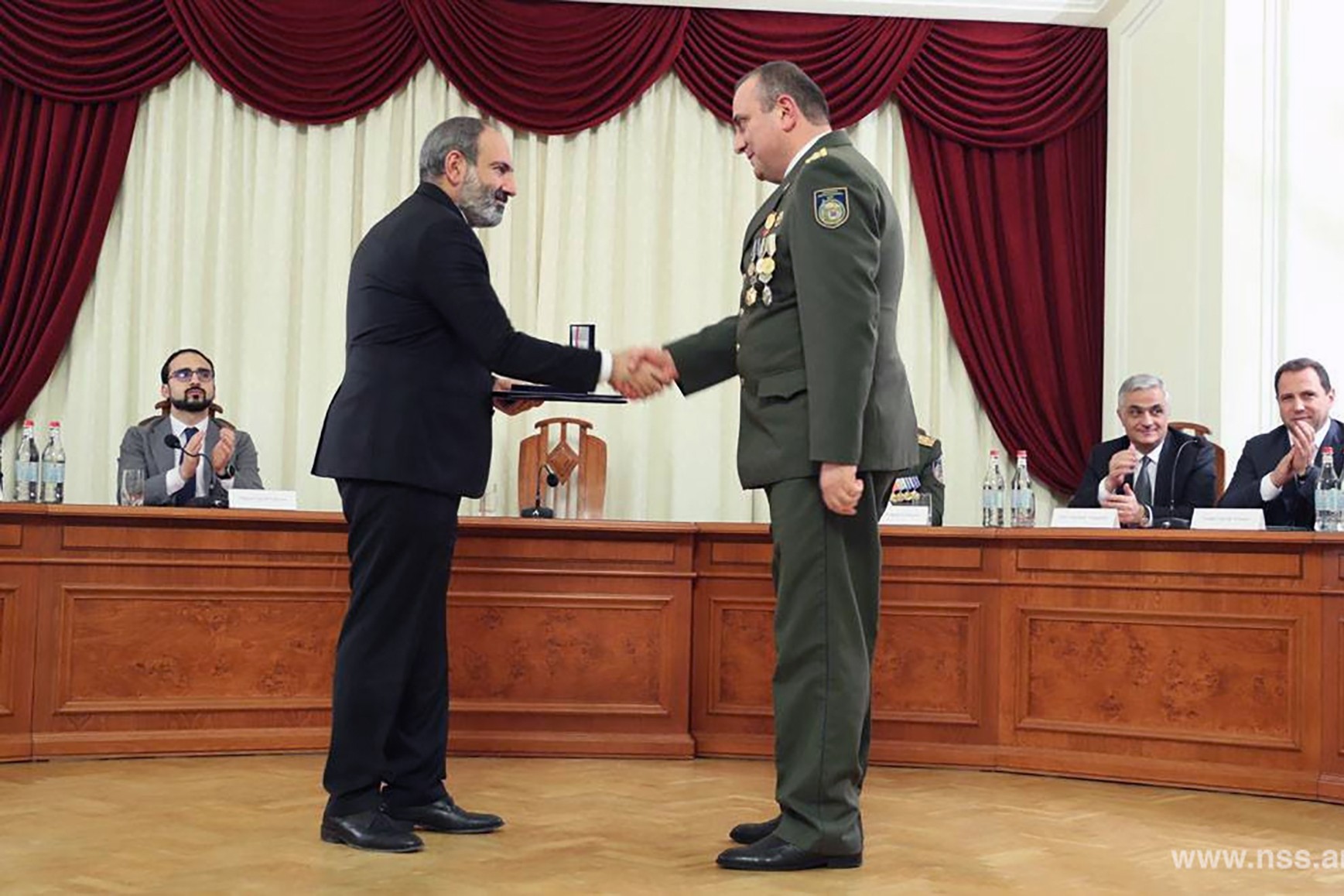
Despite promises to democratise Armenia and end official abuse, under Nikol Pashinyan, Armenia’s security agencies still stand accused of violating human rights. These accusations have become louder still in recent months after a series of controversial raids, detentions, and arrests.
In November, Armenia’s National Security Service (NSS) visited the offices of lawyer Hovhannes Chamsaryan with a warrant to seize his computers. Following an intervention by the rapid response team of the Human Rights Defender of Armenia and a court appeal, Chamsaryan succeeded in preventing the seizure.
Under Armenian law, law enforcement agencies are prohibited from searching lawyers’ documents and seizing computers and documents from them related to their work.
An NSS spokesperson told OC Media that the search of Chamsaryan’s office was conducted not with the purposes of revealing information protected under attorney-client privilege, but rather for the purposes of finding evidence of the lawyer’s involvement in a crime, for which, they said, they possessed reasonable suspicion.
For Chamsaryan, this was a poor excuse.
‘How can investigators expect to search my computer without uncovering information protected under lawyer-client privilege?’, he told OC Media. He added that there had not been an instance of law enforcement searching a lawyer’s computer in Armenia in over 10 years.
The NSS did not respond to a query about how it could expect to search Chamsaryan’s computer without violating lawyer-client privilege. Neither the NSS nor Chamsaryan have said what the alleged crime may have been.
Chamasryan’s is one of several controversial cases that have elicited debate over the role of the security services and law enforcement agencies in Armenia in recent months. Others include the arrest of Armen Tavadyan, the owner of opposition channel TV5, for bribery as well as the recent detention and subsequent release without charge of several prominent far-right opposition figures.
For many critics of Pashinyan, these cases are indicative of a broken promise to reform the government’s approach to the police and security services and are indicate a dangerous level of government overreach.
All stick and no carrot
In early September 2018, four months after the Velvet Revolution, the country was rocked by the leak of a secretly recorded phone call. The call was between top security officials and concerned the criminal case against Armenia’s second president, Robert Kocharyan, who had recently been arrested and charged with ‘usurping state power’.
Within days, the Armenian Special Investigation Service (SIS) seized computers from the offices of Yerevan Today, one of the news organisations that first published the tapes.
There was no evidence that the outlet was responsible for tapping the call, nor was it the first place it was published. Audio of the call was first uploaded to YouTube by the ‘broska333’ account. The person or persons behind the account have not been identified.
Prime Minister Nikol Pashinyan called the leaked call a ‘conspiracy and crime against the state’ and ordered the NSS and the police to find those responsible. However, no evidence was found to incriminate Yerevan Today.
Reporters Without Borders condemned the raid as a ‘violation of press freedom’.
In October 2019, the house of the father of Hrayr Tovmasyan, the president of the Constitutional Court, was searched by the NSS. The following day, they questioned his daughter.
This was followed by a decision by Pashinyan’s My Step party to start the process of deposing Tovmasyan from the Constitutional Court.
In comments to MediaLab, Avetik Ishkhanyan, the chair of the Helsinki Committee of Armenia, a human rights organisation, compared the actions of Armenia’s law enforcement agencies to the Soviet KGB. He said they had demonstrated a disregard for the rights to privacy, security, and freedom of expression.
‘It is not only a human rights violation but also […] police intimidation’, Ishkhanyan told OC Media. ‘Mere suspicions based on a criminal past do not give law enforcement the right to take such actions.’
Sargis Khandanyan, an MP from the ruling My Step party and a member of Parliament’s Human Rights Committee, denied that rights violations occurred when Tovmasyan’s family were questioned.
‘They were properly notified’, he told OC Media.
He did, however, warn of police overreach in other cases. Referring to the Yerevan Today case, Khandanyan said that ‘unless they have sufficient arguments and grounds, such actions should not be carried out.’
Debates on accountability
Armenia’s law enforcement bodies are accountable to the Prime Minister. He appoints the heads of the police, NSS, and SIS. He also has the power to remove them.
Before becoming Prime Minister, Pashinyan criticised this system and called for the creation of a government ministry responsible for law enforcement agencies.
But after assuming power, Pashinyan changed his tune, saying that while law enforcement bodies should be accountable to Parliament as a whole, not just to the Prime MInister’s Office, he no longer believed in the creation of a specialised ministry.
Stepan Danielyan, a political scientist and chair of the Collaboration for Democracy Centre, told OC Media that this was one of many unfulfilled promises from Pashinyan.
‘When he was in opposition, the content of his promises was to reduce the powers of the government to the benefit of parliament’, Danielyan said. ‘As the situation has changed, he has personally benefited from the great powers of the [office of] Prime Minister — which is explained away with the “danger of counter-revolution”.’
Human rights activist Avetik Ishkhanyan said that if those bodies were unified under a new ministry, it may be possible to avoid future abuses, in part because they would be forced to participate in regular Q&A sessions with parliament and could be called to parliamentary hearings.
This, Ishkhanyan said, would make law enforcement ‘think twice before pursuing politically-motivated cases.’
Some supporters of Nikol Pashinyan have been critical of this proposal. MP Sargis Khandanyan told OC Media that while he agreed it would be better if law enforcement bodies were more accountable to Parliament, he was worried that agencies gaining more authority may give them too much independence and turn them into ‘super-agencies’.
For Stepan Danielyan, such fears are overstated. He told OC Media that he does not see a significant danger of ‘super-agencies’ emerging. The existing track record of law enforcement bodies in Armenia though, he said, makes structural reforms urgent.






